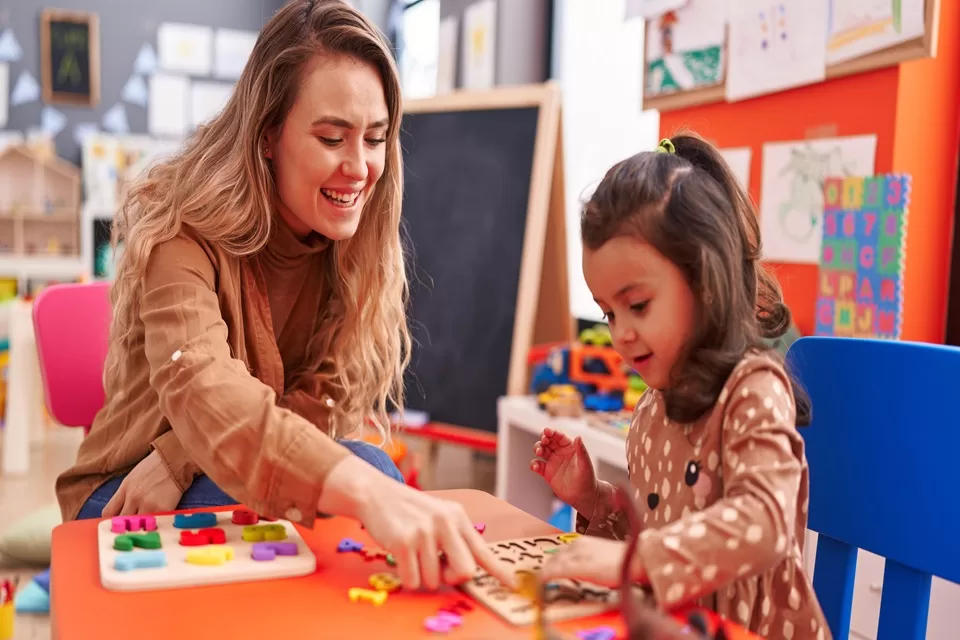Qualities of an Exceptional Childcare Educator

Childcare educators are people set apart. The intricacies of this role- including its range of responsibilities whose purpose is to nurture a child’s well-being, development and learning- make these professionals special. An exceptional childcare educator will possess a combination of personal qualities and professional skills to deliver an optimal learning environment for young children.

Teacher and toddler playing with maths puzzle game sitting on table at kindergarten.
Let’s explore some key attributes to find qualified childcare educators.
-
Passion
An exceptional childcare educator will demonstrate a genuine passion for working with children and a commitment to their education. This enthusiasm will be evident in how they engage with the children, plan activities and lessons, and establish a positive learning environment. Passion is infectious, and a passionate childcare educator can inspire and motivate children to develop a love for learning.
-
Patience
Patience constitutes one of a childcare educator’s most critical qualities. Working with young children can be difficult and frustrating at times. An educator needs to be able to handle challenging circumstances while remaining composed and controlled. Moreover, responding to a child’s needs with understanding, empathy, and patience is paramount.
-
Communication Skills
Excellent communication skills are essential for a childcare educator. They must be able to communicate with children and adapt their language accordingly and effectively. An exceptional childcare educator will also maintain clear and open communication channels with parents and other staff members, ensuring that all parties are well-informed about a child’s progress, needs, and potential concerns.
-
Creativity
An outstanding childcare educator will possess creative skills, enabling them to devise age-appropriate activities and lessons that engage and stimulate children’s curiosity and learning. This creativity should extend to resourcefulness – an ability to think outside the box and utilise available materials and resources innovatively.
-
Adaptability
Working with children requires adaptability and flexibility. Children’s moods, interests, and needs can change rapidly, and an exceptional childcare educator should be able to respond accordingly. This response might involve adjusting activities or lesson plans to accommodate a child’s interests or needs, reacting to incidents, and providing support when issues arise.
-
Knowledge
An effective childcare educator will be well-versed in early childhood education and child development. They should be knowledgeable about learning techniques appropriate for each age group and comprehend the physical, social, emotional, and cognitive domains of development. This knowledge will enable the educator to provide opportunities and experiences that encourage growth and learning in all developmental areas.
-
Observation Skills
Observation is a vital component of a childcare educator’s role. Exceptional educators should be able to observe children during play and learning tasks, recognise signs of developmental progress, and identify any potential concerns. These observations will allow the educator to plan targeted interventions to support individual needs, ensuring each child can thrive and succeed.
-
Attention to Health and Safety
The health and safety of the children in their care must always come first for childcare educators. This prioritisation accounts for things like ensuring the atmosphere is risk-free, monitoring disease symptoms, and providing the proper first aid when called for. Additionally, exceptional childcare instructors will keep up-to-date with pertinent health and safety regulations and proactively apply them.
-
Collaboration Skills and Professionalism
An exceptional childcare educator will recognise the value of collaboration and work well as part of a team. They also uphold the highest levels of professionalism in all facets of their work.
Conclusion
Outstanding childcare professionals are able to give young children the best learning environment because of a combination of their personal traits and technical abilities. By fostering an atmosphere of passion, patience, creativity, and adaptability, these educators can inspire a love for learning in future generations.









